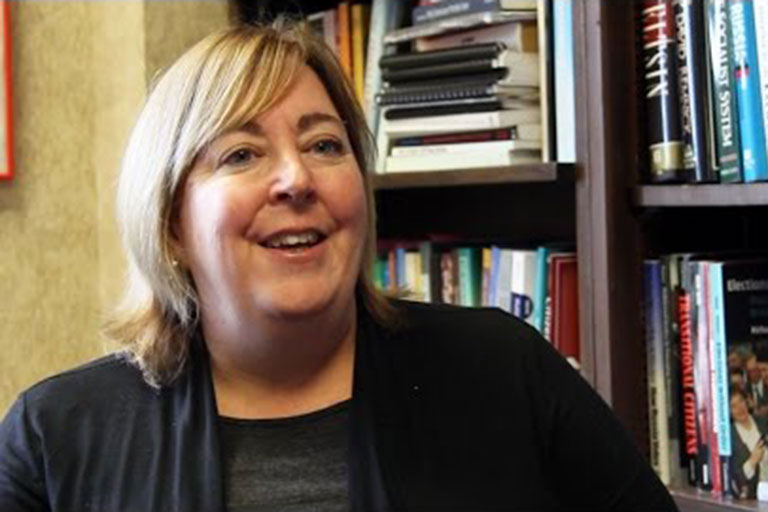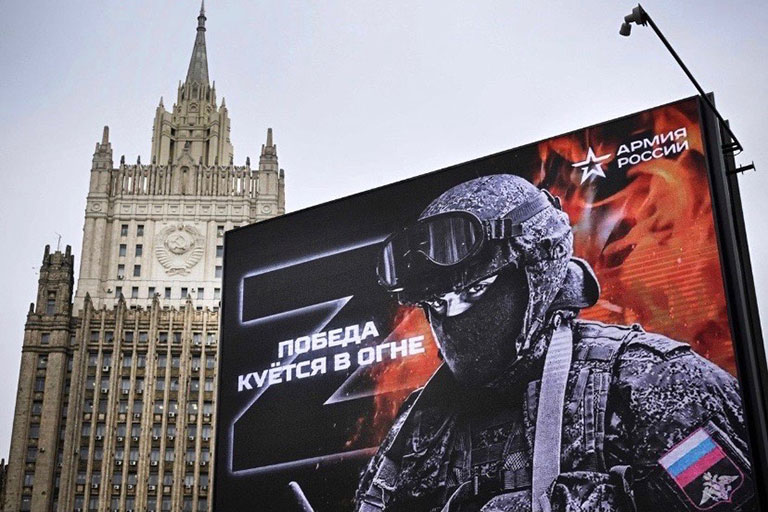Following the Russian invasion of Ukraine last February, Indiana University's Regina Smyth wanted to contribute to the dialogue between faculty and students concerning the war.
Smyth, a professor of political science in the College of Arts and Sciences, created a class that allows students to learn about the conflict between Russia and Ukraine by providing historical context and current perspectives through active discussion. The class, "Russia at War," is available to both undergraduate and graduate students and begins with five myths and five questions concerning the conflict. Smyth strives to debunk misconceptions by relying on new data and research presented by world renowned scholars.
"This is a new course designed to complement the other programming on IU's campus about the war," Smyth said. "The course provides an opportunity to discuss Russian actions and policy, how Russians see things and perhaps most importantly, how others see Russia."
In the class, she strives to counter the effect of disinformation by clarifying Putin's false narratives such as Ukraine’s historical role as Russia’s "little brother." Students gain information and frameworks to explore the complexity of Russian's support for the war and President Putin and the effect of sanctions on Russia’s economic development.
"IU students are the future 'Russia hands' who will inform policymaking for post-War period," Smyth said. "My goal in the class is to contribute to a foundation for those careers."
The class includes a speaker series which is open to the public and features researchers who will present their updated research on the Russia and Ukraine conflict from a wide variety of perspectives and evidence.
The speaker series takes place between early February and early April and will kick-off with a talk by Professor Brian Taylor that will explore the mentalities of Putin and his close circle that led to the decision to escalate conflict with Ukraine. The series reflects IU's broad commitments to regional studies and international studies and is sponsored by the College of Arts and Sciences International Initiative, the College Arts and Humanities Institute, the Office of the Vice Provost for International Affairs, the Russian and East European Institute and the Russian Studies Workshop, the Departments of Political Science and Slavic Languages, the Patten Lecture Series and the Institute for Humane Studies.
"What I really want to do is to show interested students and community members other ways to find out information to understand this unthinkable conflict," Smyth said. "IU is an important centers of knowledge production about the war and post-Soviet empire politics. Russia's invasion is first and foremost a tragedy for Ukraine, but it has adverse implications for the United States and the rest of the world, and this class provides tools for students to understand events and predict what may happen next."
Topics for the series range from debates over the origins of the war to religious aspects of conflict, new forms of repression in Russia and popular responses to the Kremlin’s disinformation efforts. The speaker series is an opportunity unique to IU and the presented information is valuable in shaping the American opinion of the war.
Talks will be held in Woodburn Hall, Room 101, 6:30 p.m. to 8:00 p.m. For information or to join the mailing list, please email Smyth at rsmyth@indiana.edu.
Upcoming Speakers
February 6 – "Putin's War," Professor Brian Taylor, Syracuse University
February 8 – "Russia Standing in the World after February 24," Professor Marlene Laruelle, Director, Institute for European, Russian and Eurasian Studies (IERES), The George Washington University, online
February 13 - "Priming the Public for War: Television and Russia's Invasions of Ukraine and Georgia," Paul J. Goode, Associate Professor and MacMillan Chair at the Institute of European, Russian and Eurasian Studies, Carleton University
February 22 – "Russia and Ukraine: Entangled Histories, Diverging States," Professor Oxana Shevel, Tufts University, and Maria Popova, McGill University
March 1 – "Russia's Defensive Consolidation," Professor Jeremy Morris, Arhus University, Denmark, online
March 6 – "The Russian Orthodox Church and the Conduct of War at Home and Abroad," Professor John Burgess, Pittsburgh Theological Seminary
March 22 – "Symbolic Politics for and Against the War: Wartime Graffiti," Professor Alexis Lerner
March 27 – "Why Ukraine must Win: Russia's War in Ukraine and the Battle for Liberal Democracy," Professor Frances Fukuyama, Stanford University and IU Patten Lecturer
March 29 – "Renewed Repression: Russia's Reliance on Law to Limit Speech," Professor Lauren McCarthy, University of Massachusetts at Amherst
April 12 – "The Russian Wartime Diaspora as an Anti-War Movement," Professor Margarita Zavadskaya, University of Helsinki
April 17 – "The End of the Near Abroad? The Effect of War on Russia's Relations in Central Asia," Professor Pauline Jones, University of Michigan



